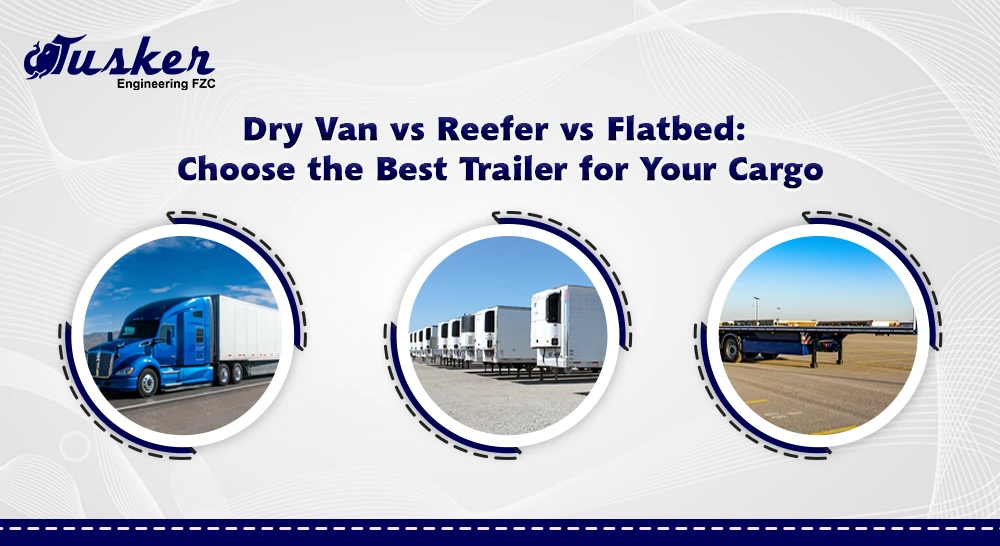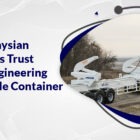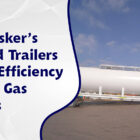When it comes to moving cargo across the country, not all trailers are created equal. Ever wonder why some products need to be shipped in climate-controlled units, while others are loaded onto open platforms? Or why certain goods are packed tightly in enclosed trailers?
The type of trailer you choose can make or break the success of your shipment. In this blog, we’ll unravel the differences between Dry Van, Reefer, and Flatbed trailers – each with its unique strengths and challenges. So, without further ado let’s delve in to make a well-informed decision.
What is a Trailer for a Truck?
A trailer for a cargo truck is a large, unpowered vehicle that is designed to be attached to and pulled by a truck or tractor unit. It is used to transport goods and materials over long distances by road.
Tusker Engineering FZC stands out in the industry for manufacturing & supplying reliable cargo vehicle trailers in the UAE. Their commitment to quality and innovation ensures improved operational efficiency,
Dry Van vs Reefer vs Flatbed Trailer
When comparing Dry Van vs Reefer vs Flatbed trailers, it’s essential to understand the differences and advantages each type offers. These trailers serve different purposes and cater to various transportation methods within the trucking industry.
Dry Van Trailer for Truck
Definition: A dry van trailer is a common type of trailer used for transporting non-perishable goods. It’s an enclosed trailer, protecting from bad weather and external elements. Dry van trucking is ideal for goods like clothing, electronics, and furniture.
Dry Van Trailer Advantages
Versatility: Can carry a wide variety of goods, making it a staple in the trucking industry.
Security: The enclosed design ensures the protection of freight from theft and damage.
Availability: These are the most common types of trailers, making them easy to find in any trucking company.
Drop and Hook Option: Dry vans often offer this option, speeding up the loading or unloading process.
Dry Van Trailer Key Considerations
Weight Limits: In comparison of dry van vs reefer trailers, dry van trailers may not handle very heavy or oversized loads well.
No Temperature Control: Unlike a reefer trailer, dry vans cannot transport temperature-sensitive goods.
Reefer Trailer for Truck
A reefer trailer (short for “refrigerated trailer”) is a temperature-controlled unit specifically designed to transport temperature-sensitive freight. Equipped with a refrigeration unit, it can maintain a precise temperature range, whether cold or warm, to preserve the quality and safety of the cargo. Reefer trailers in UAE are Commonly used for transporting perishable goods such as food, beverages, pharmaceuticals, and other products that require strict temperature control. Get in touch with Tusker Engineering- a renowned reefer truck manufacturer today.
Reefer Trailer Advantages
Temperature Control: Can maintain a consistent temperature, protecting the cargo from spoilage or degradation.
Extended Reach: Allows perishable goods to be transported over long distances without compromising their quality.
Dual Functionality: Some reefers can operate as a dry van trailer when refrigeration isn’t needed, adding versatility.
Reefer Trailer Key Considerations
Higher Costs: Operating and maintaining a reefer trailer is more expensive due to the refrigeration system.
Specialised Maintenance: Requires regular maintenance from a reefer trailer manufacturer to ensure proper operation.
Limited Space: The refrigeration unit may reduce the cargo space, limiting the amount of freight that can be loaded.
Flatbed Trailer for Truck
A flatbed trailer is a type of open-deck trailer with no sides or roof, providing a versatile platform for transporting large, heavy, or irregularly shaped items that cannot fit in enclosed trailers like dry vans or reefers. These flatbed trailers for sale are ideal for transporting construction materials, industrial machinery, vehicles, and other bulky items.
Flatbed Trailer Advantages
Loading Flexibility: Flatbed trailers allow for loading or unloading from any direction; side, rear, or top making them suitable for a wide range of cargo.
No Size Restrictions: Unlike dry vans or reefers, flatbeds can carry cargo that exceeds standard dimensions, accommodating oversized loads without issue.
Heavy-Duty Capacity: Built to handle heavy loads, flatbeds can carry large quantities of materials, making them efficient for transporting bulky items.
Flatbed Trailer Key Considerations
Exposure to Elements: The lack of enclosure leaves the cargo exposed to bad weather and other environmental factors, requiring protective measures like tarping.
Increased Risk of Theft: Without sides or a roof, the cargo is more vulnerable to theft, necessitating additional security measures.
Specialised Equipment Required: Flatbed trailers often require cranes, forklifts, or other specialised equipment for loading or unloading, adding complexity to the shipping process.
Bottom Line
No matter which trailer fits your needs, whether it’s Dry van vs Reefer vs Flatbed trailer – one thing is certain: having a reliable partner in the UAE to provide top-quality, durable trailers is crucial. That’s where Tusker Engineering FZC comes in.
As a leading commercial vehicle body manufacturer in UAE, Tusker Engineering FZC delivers exceptional trailers that cater to a wide range of transportation requirements. So, when choosing the best trailer for your cargo, remember that we are here to guide you. Reach out to our team to know more about trailers and tail lifts for sale in UAE.







